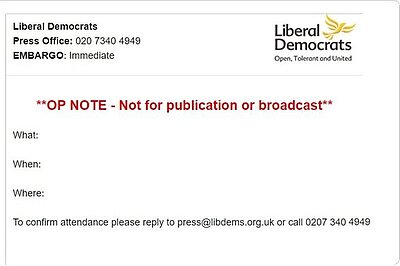Writing Operational Notes
When planning a visit or event in which you want media to attend, you should send out an operational note ('op note') to clearly lay out the details of the event. The op note is effectively your invitation to the press to whatever you're arranging, so it's important that you communicate what journalists, photographers and camera crews can expect from it. That's how to get them to attend, which in turn is what gets you coverage and column inches.
The op note is not for publication or broadcast, it is just to give key details to make sure people know where to turn up, and when.
An op note looks like this:

What: you should cover who is present and the purpose of the speech/event/visit.
When: should simply be a time, or a list of timings, for the start and end of the event. If there are multiple stages (for example a tour of a venue followed by a Q&A session), then list the planned timings for these as accurately as possible.
Where: the location(s) of the event. For all addresses, make sure that post codes are listed, so that they can be used in sat navs and smartphone maps.
If a spokesperson, such as a local councillor or your PPC, is keen to talk to the media, it is worth adding a line saying '[Spokesperson] is available for questions at the end of the visit', or something similar. You may wish to nominate somebody in your local party to be a point of contact for the press, who can arrange these interviews.
If is helpful, but not vital, to ask people to confirm their attendance, just so that you are clear on numbers and who to expect.